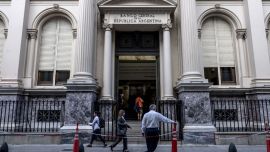Some of Argentina’s largest creditors presented a new debt proposal to the government over the weekend as the two sides edge closer to a US$65-billion restructuring deal, according to people familiar with the matter.
The Ad Hoc Bondholder Group and Exchange Bondholder Group submitted an offer in which they agreed to accept losses on a net-present value basis of about 44 percent to 46 percent, said the people, who requested anonymity because the talks are private. They also reiterated the need for a sweetener tied to Argentina’s gross domestic product as calculated by the International Monetary Fund.
While the latest version is getting closer to the levels sought by President Alberto Fernández’s government, it remains outside the threshold Argentine officials are willing to accept, some of the people said. The Economy Ministry had pushed a plan last week that called for NPV losses of about 50 percent with a sweetener linked to agricultural exports. Some bondholders have expressed a willingness to reach a deal taking losses of as much as 48 percent, the people said.
Representatives for the Economy Ministry and the Exchange Bondholder Group declined to comment, while a spokesperson for the Ad Hoc Bondholder Group didn’t respond to messages.
Investors and the government have narrowed their gap since Argentina’s default on May 22. Still, the path to a deal is challenged by the competing interests of various bondholders, the IMF and local officials. Even Mexican President Andrés Manuel López Obrador has gotten involved as an intermediary between Fernández and BlackRock Inc.’s Larry Fink.
Economy Minister Martín Guzmán told the Brazilian newspaper Folha de São Paulo that he’s confident an agreement can be reached this week. The government extended its deadline for a debt deal until Friday.
One of the lingering uncertainties is whether creditors can reach an agreement with the government on a sweetener. Some bondholders are supportive of the export warrants because they think the agricultural data are more transparent and frequent than GDP figures. They’ve even discussed hiring agronomists based in Argentina to get the best insights on crop cycles, the people said.
Yet other creditors warn that the instruments are too unpredictable and that a security linked to GDP is the best fit, especially since the country’s debt sustainability analysis is based on GDP estimates, the people said.
President Fernández said in an interview broadcast on Sunday with Radio 10 that the government is working on an improved proposal.
“Now we’re trying to come up with a new offer, showing our willingness and good faith to reach a deal, trying to make a new offer that gets a little closer to the creditors,” he said.
related news
by Ben Bartenstein & Jorgelina do Rosario, Bloomberg




















Comments